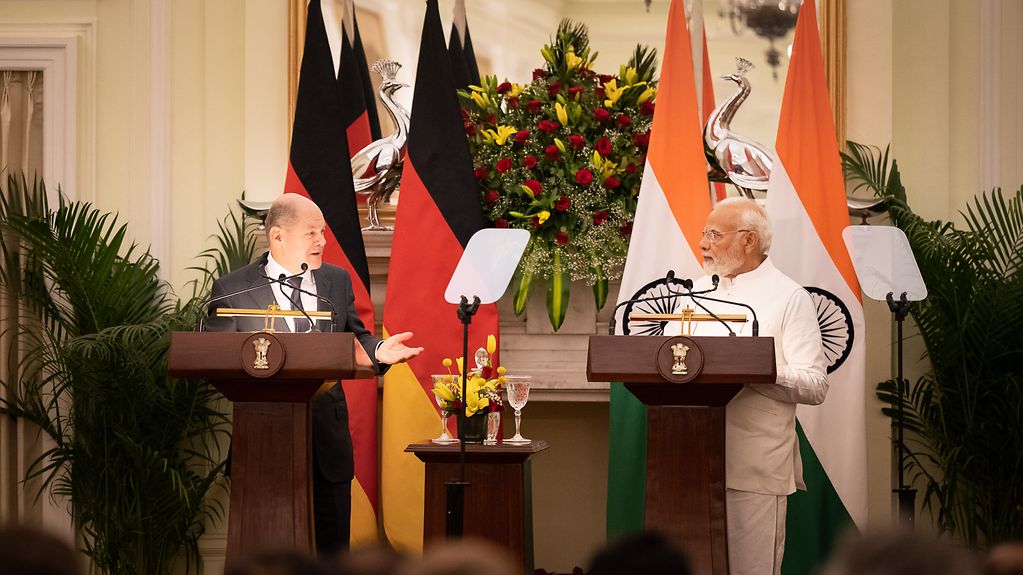Federal Chancellor Scholz in India
Federal Chancellor Scholz made his inaugural state visit to India. Following his talks in New Delhi and Bangalore, the Federal Chancellor feels that there is great interest in deepening relations, both politically and economically.
4 Min. Lesedauer

Federal Chancellor Olaf Scholz and Indian Prime Minister Narendra Modi hold a joint press conference following their meeting in New Delhi.
Foto: Federal Government/Kugler
The Federal Chancellor held business meetings in Bangalore, one of the country's most important science and high-tech centres, on the second and final day of his trip to India.
Strengthening economic development
Following his visit to SAP Labs India, the Federal Chancellor was impressed by India as a high-tech nation with great expertise in digitalisation and software development. "We want to and must take advantage of the potential that exists here, which, among other things, will help us to boost the resilience of our own economy," said Scholz.
The potential for IT and software development as well as artificial intelligence, he said, would be positive for economic development in the globalised world, but especially for Germany. The day before, Scholz had already emphasised Germany's great interest in collaborating in other economic sectors such as renewable energies, wind power, solar energy, and biomass.
Simplifying migration for skilled labour
"The many thousands of dedicated young skilled professionals," said Scholz in Bangalore, "are one of the most impressive things to see here." The Federal Chancellor had already praised the good collaboration on the migration and mobility agreement in New Delhi with a view to improving the situation of skilled labour migration.
He referred to the agreement, under which a very large number of professionals from India are already moving to Germany, as a "model agreement for all that is possible in terms of the global economy," adding that: "We are very proud of this agreement and I can assure you that we will overcome all the practical challenges that arise to ensure that as many talented people as possible will be able to take advantage of the available opportunities."
The Federal Chancellor also visited a company in Bangalore called Sun Mobility, which produces replaceable batteries for electric vehicles. The company develops innovative e-mobility products in collaboration with Bosch, in particular battery exchange stations for small vehicles and trucks.
Expanding bilateral relations
The Federal Chancellor spent Saturday in political talks in New Delhi, the capital city. Following his conversation with Prime Minister Narendra Modi, the Federal Chancellor stressed the importance of bilateral relations between the two countries. "I'm convinced that our two countries share a close bond because we have similar ideas, particularly about democracy and what it means for our lives and for the future." That was why, he went on, it was now important to seize the opportunities to further improve and expand economic, political, and cultural relations in various fields.
Collaboration among the G20
Turning to the G20, he referred to the important decisions taken last year and emphasised India's role of responsibility in this year's G20 Presidency.
One of the key issues, in this context, he said, was to secure the food and energy supply in countries in the Global South. "We must ensure," said Scholz, "that the terrible war of aggression launched by Russia against Ukraine does not result in price hikes, energy shortages, and food scarcity throughout Asia, Africa, and South America."
A clear position on the war against Ukraine
In terms of the war between Russia and Ukraine, the Federal Chancellor said that the G20 had been so successful last year because, in addition to Indonesia, India and other countries of the Global South, these countries had "helped to formulate strong, clear statements about the war in general, and in particular, about the non-use of nuclear weapons in the war. It will be essential to build on this when decisions are prepared this year."
Scholz went on to say that: "This is a terrible war with an incredibly high number of casualties, as well as destroyed cities, villages, railway lines, and energy supply infrastructure, and this is a major catastrophe."
This war, he added, was a breach of a principle upon which the international community had long agreed, namely "that borders should not be moved by force, and that international relations should be shaped by law, and that revisionism should not be the basis for state action". This, he said, was why it was very important that the United Nations had repeatedly issued very clear statements on this matter.
Combating climate change
Another key issue, he said, was the fight against climate change: "The results of our Indo-German partnership for green and sustainable development are impressive, and we have now signed many agreements that include a lot of opportunities in this area."
Important developments, he said, would include wind and solar energy, biomass, the development of digital facilities in the grids, and the issue of hydrogen and green hydrogen. "Also," he explained, "we want to develop this on a global scale as part of the climate club that we are currently developing."